Antonio Ray Harvey
S. F. NAACP Clarifies Statement on $5M Payouts: Reparations Should Be Cash Payments, Plus ‘Investments’
The San Francisco Branch of the NAACP is engaged in a public information blitz to clarify a press release it sent out urging the San Francisco city government to reject a proposal to pay each qualifying Black city resident a one-time lump sum reparation payment of $5 million. The Rev. Amos Brown, a member of the San Francisco reparations board, pastor of Third Baptist Church, and the president of the San Francisco NAACP, released a March 14 statement before the recommendations were presented to the supervisors rejecting the $5 million payout.
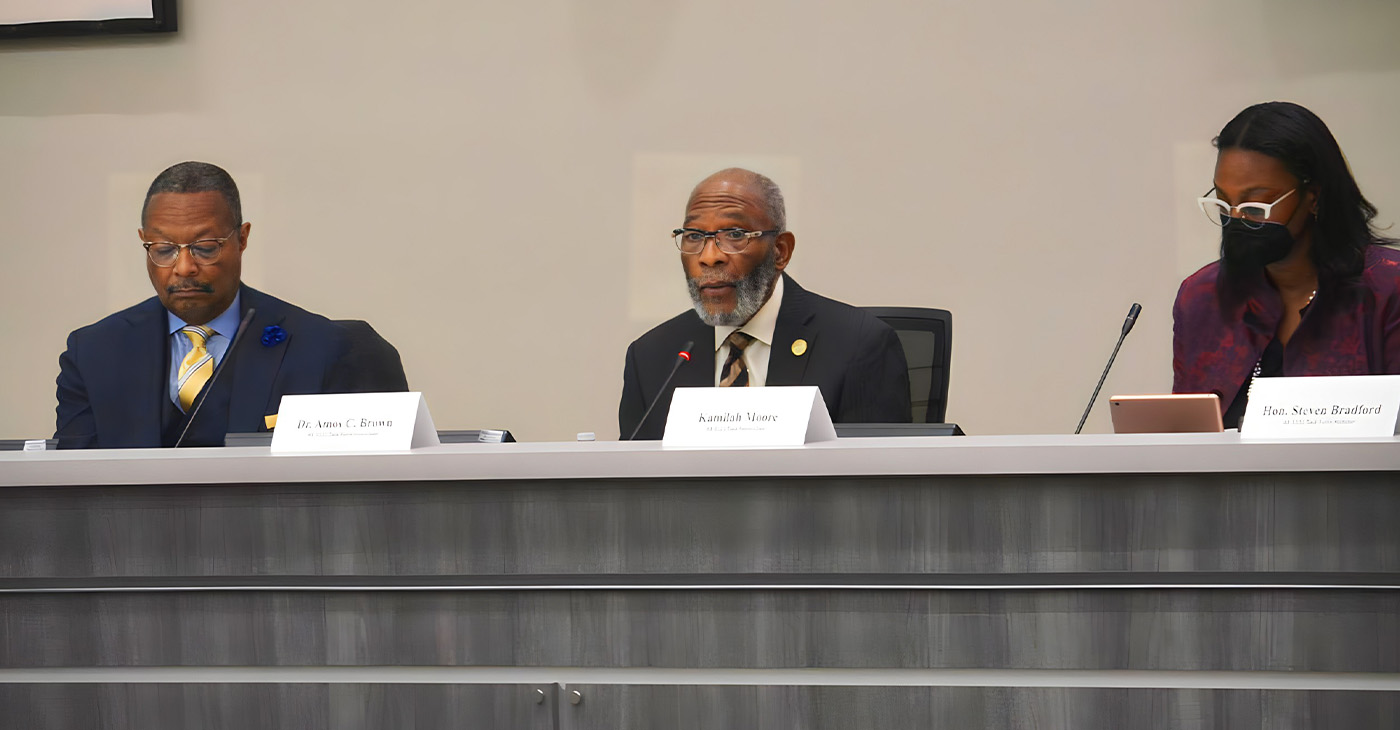
By Antonio Ray Harvey and Manny Otiko, California Black Media
Note: This article has been updated and republished for clarity. A view about the inability of the City of San Francisco to afford paying reparations payments to its Black residents who qualify was expressed by several San Francisco Board of Supervisors members. That perspective was accurately captured in the story. However, that point of view was attributed to one member, Dean E. Preston, in a direct quote that did not reflect his words verbatim.
The San Francisco Branch of the NAACP is engaged in a public information blitz to clarify a press release it sent out urging the San Francisco city government to reject a proposal to pay each qualifying Black city resident a one-time lump sum reparation payment of $5 million.
The Rev. Amos Brown, a member of the San Francisco reparations board, pastor of Third Baptist Church, and the president of the San Francisco NAACP, released a March 14 statement before the recommendations were presented to the supervisors rejecting the $5 million payout.
Reparations should focus on investments and opportunities in five areas: education, employment, housing, healthcare, and a culture center for San Francisco’s Black residents, the prepared statement reads.
“We strongly believe that creating and funding programs that can improve the lives of those who have been impacted by racism and discrimination is the best path forward toward equality and justice,” Brown stated. Brown is the vice-chairperson of the California Reparation Task Force, which is proposing recommendations for two million Black residents in California.
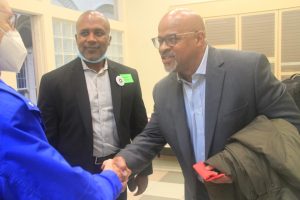
Eric McDowell, right, the chairperson for San Francisco’s African American Reparations Advisory Committee (AARAC), said the committee presented 111 recommendations of reparations to the city’s Board of Supervisors. CBM photo by Antonio Ray Harvey. December 2022.
The NAACP’s press release was met with immediate backlash by supporters in the movement for reparations across the country who have, for decades now, invested time, energy and money into bringing the issue to national attention.
In 2020, California became the first state to set up a task force to investigate the state’s involvement in slavery, state-sanctioned atrocities against African Americans and all other forms of discrimination and discriminatory policy that excluded Black Californians from state benefits or protections or that prevented them from gaining social or economic power.
“This is reprehensible. It is a betrayal to Black Americans,” tweeted Bishop Talbert Swan on March 17 reacting to the press release.
“As a life member of the NAACP and the longest-serving president in the history of my branch, I am ashamed by the position taken by the San Francisco branch.”
Brown has since clarified in several public appearances that he is not against the idea of a cash payout but only wants the recommendation to be a reasonable compromise — one, he says, that does not give the city’s Black residents “false hope.”
“We don’t want to get set up for another study or for them to put this up on a shelf to collect dust,” said Brown in an interview with Roland Martin. “We must have action. We believe in cash-plus — not either or.”
Eric McDowell, chairperson of the African American Reparations Advisory Committee (AARAC) — a task force set up by San Francisco city government — said that recommendations presented to the Board of Supervisors is an “appraisal” and he is “hopeful” that the city will deliver much needed compensation for the Black community.
McDowell made the statements in an interview with San Francisco’s KRON 4 News on March 24. AARAC presented recommendations on March 14 to address the harms and struggles Black Americans have endured since they began migrating west after the Civil War.
“What the city will decide to do is fully in the hands of the supervisors, mayor’s office and full leadership of the city,” McDowell said in the six-minute segment. “We’re hopeful as a committee that they will take up the charge and do what they believe both is right to do and have the capacity to do.”
The recommendations, McDowell said, are only in “draft” form at this stage. They cover economic empowerment, education, generational wealth building and public policies for the benefit of Black San Franciscans. McDowell referred to the recommendation as an estimation of value.
“Our task (AARAC) was to do the appraisal and it’s the city’s task to determine, based upon recommendations, what they decide to adopt,” McDowell said.
“Once again, that conversation is yet to come: the determination of how it will get financed and made possible,” McDowell continued, talking about reparations payments to San Franciscans who are Black American descendants of enslaved people.
The 14-person reparations committee advises the Board of Supervisors, Mayor London Breed, the Human Rights Commission and the public on the development of a San Francisco Reparations Plan. The plan features ways that San Francisco’s policies have harmed Black lives.
Giving qualifying Black residents individual payments of $5 million, the elimination of personal debt and tax liabilities of African American households and securing annual incomes at a minimum $97,000 for 250 years are part of the package the committee is proposing.
San Francisco’s Black population is 6% of the city’s total number of residents and they make up 38% of the city’s homeless population.
The AARAC has documented decades of policies and laws that systematically affected Black Americans in San Francisco, limiting their access to productive employment property, education and the ability to build generational wealth.
A decision by the Board of Supervisors on the amount of compensation owed to Black residents or the form it will take is not expected until June. Meanwhile, the city is mulling over the fact that providing financial compensation will push it deeper into the red, a point that has been made by some city officials that many who oppose reparations for Black Americans have latched onto and referenced in their arguments.
“I wish we had this kind of money in San Francisco’s general fund, but if we want to maintain the services that exist today, we do not,” said Supervisor Hillary Ronen in a San Francisco Chronicle interview.
San Francisco is currently facing a deficit of more than $720 million over the next 24 months. Supervisor Dean Preston told the San Francisco Chronicle that reparations are warranted but not financially feasible for the city.
Antonio Ray Harvey
Sacramento Lawmakers Step Up Push for “Smart Solutions” on Crime, Public Safety
Assemblymember Tina McKinnor (D-Inglewood) and Sen. Lola Smallwood-Cuevas (D-Ladera Heights), both members of the California Legislative Black Caucus (CLBC), have joined other lawmakers and criminal justice reform advocates to address public safety in the state. On April 2, CLBC members gathered outside the State Capitol for the unveiling of the #SmartSolutions Public Safety Policy Platform, a package of 30 bills that addresses the top concerns of retailers, retail workers, the fentanyl crisis, and support for victims and survivors of crime.
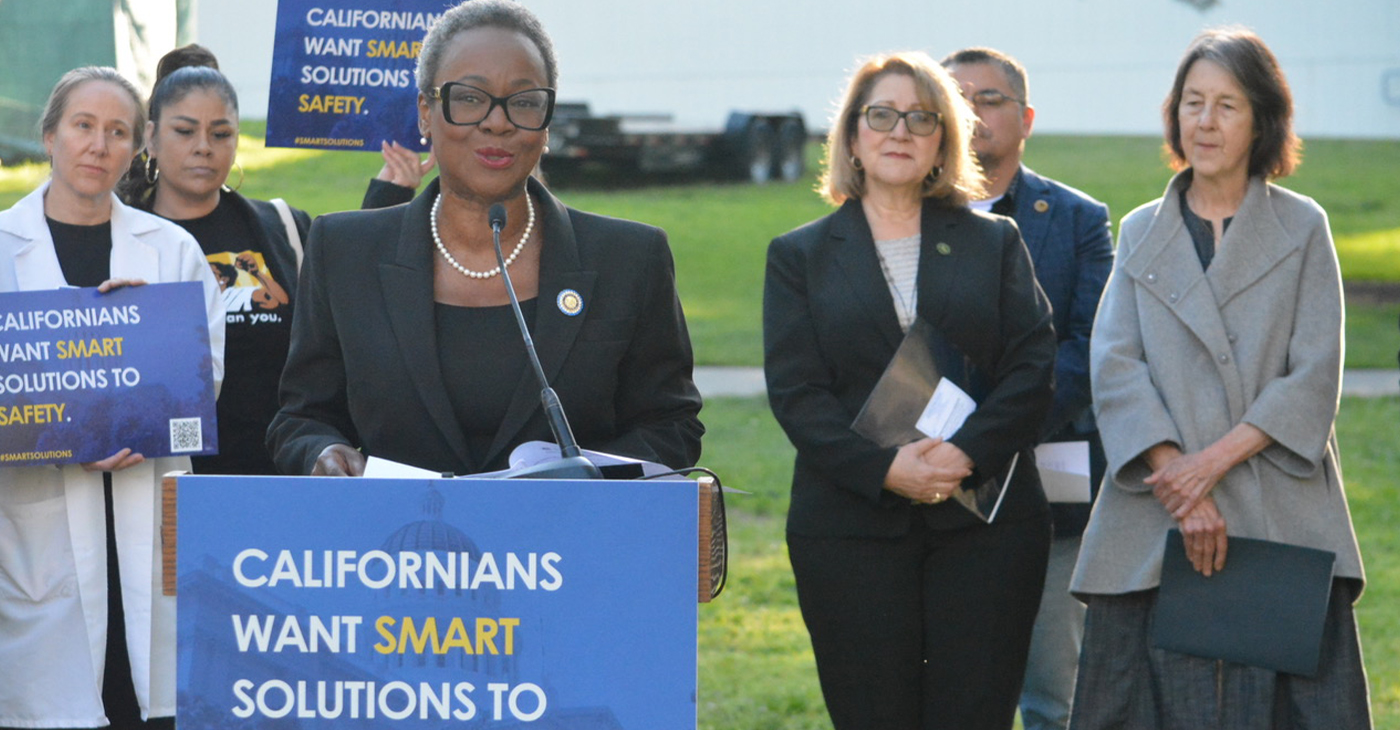
By Antonio Ray Harvey, California Black Media
Assemblymember Tina McKinnor (D-Inglewood) and Sen. Lola Smallwood-Cuevas (D-Ladera Heights), both members of the California Legislative Black Caucus (CLBC), have joined other lawmakers and criminal justice reform advocates to address public safety in the state.
On April 2, CLBC members gathered outside the State Capitol for the unveiling of the #SmartSolutions Public Safety Policy Platform, a package of 30 bills that addresses the top concerns of retailers, retail workers, the fentanyl crisis, and support for victims and survivors of crime.
“Instead of being tough on crime, we need to be smart on crime,” Smallwood said at the press briefing. “I am not saying that we’re not going to be holding folks accountable for the actions that they take. But we will not rely on incarceration as a solution.”
McKinnor, Smallwood-Cuevas, a coalition of advocates, addiction treatment experts, and Yurok Tribal leaders joined Sen. Nancy Skinner (D-Berkeley), and Assemblymember Eloise Gómez Reyes (D-Colton) at the press conference organized to promote legislative solutions that ensure safety and justice.
Organizers say #SmartSolutions is an intersectional campaign that combats criminalization and mass incarceration by pushing for the redirection of state resources to fund housing, health care, schools, services for victims, and programs that reduce recidivism and promote accountability, beyond incarceration.
Opponents of the bills proposed in the #SmartSolutions campaign say their colleagues who support reform-focused strategies are looking the other way on crime and encouraging lawlessness.
For example, Assemblymembers Wendy Carillo (D-Boyle Heights), Carlos Villapudua (D-Stockton) and Mike Gipson (D-Carson) are supporting Assembly Bill (AB) 1990, legislation that would allow a peace officer to arrest shoplifters without a warrant or without witnessing the theft.
Assemblymember James Ramos (D-Highland) authored AB 1772 and introduced it in January. The legislation proposes sterner penalties for retail theft, particularly for repeat offenders.
The #SmartSolutions campaign is co-sponsored by Ella Baker Center for Human Rights, Smart Justice California, American Civil Liberties Union (ACLU) California Action, Californians for Safety and Justice, and Californians United for a Responsible Budget (CURB).
Smallwood recently introduced two bills she hopes will provide solutions to the escalating retail theft problem in the state. Senate Bill (SB) 1446 addresses theft, technology and job security in retail establishments and aims to minimize workplace violence, according to supporters. SB 1282 requires counties to expand the use of a diversion program for theft cases.
“Restorative Justice is the essential pillar of making our criminal justice system more fair, just, and equitable,” McKinnor said. “Restorative justice recognizes the trauma of victims and preparatory of crimes and provides a constructive space for victims to find healing.”
Dr. Amiee Moulin, founder of the California Bridge program and chief of the Division of Addiction Medicine at the University of California (UC) Medical Center, said drug “addiction and overdose” are taking a toll on patients, families and the community.
“I believe that California’s proposed legislation focused on expanding access to treatment is a crucial step towards saving lives,” Moulin said. “By removing barriers to care and embracing evidenced-based strategies we can provide patients the support they need to heal and recover.”
Antonio Ray Harvey
Advocates Weigh in on Calif. Black Caucus Reparations Package
On Feb. 21, the California Legislative Black Caucus (CLBC) held a press conference at the state Capitol to introduce a package of reparations legislation the lawmakers call “a starting point” to atone for the state’s legacy of discrimination. All 12 members of the CLBC were present to explain their efforts to rectify the damages caused by systemic discrimination against Black Californians detailed in the 1,100-page report by the first-in-the-nation California reparations task force.
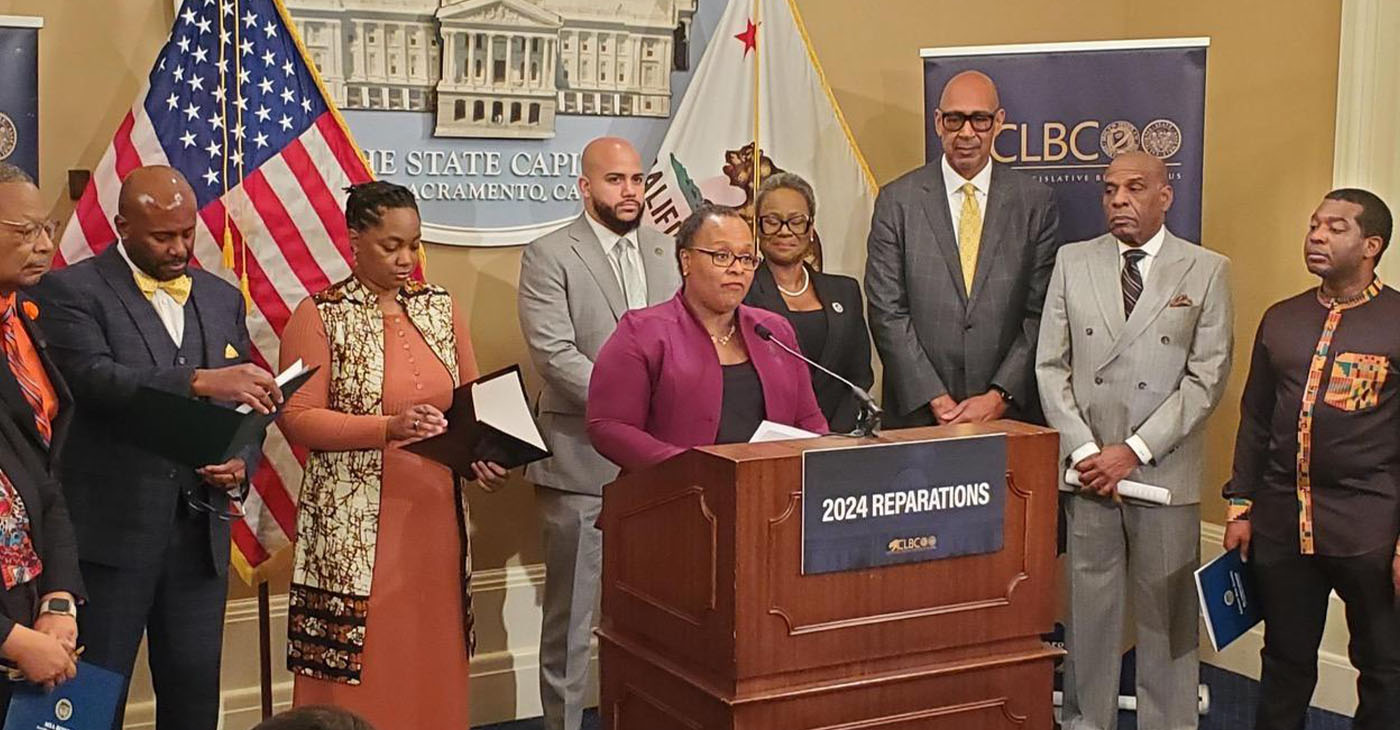
By Antonio Ray Harvey
California Black Media
On Feb. 21, the California Legislative Black Caucus (CLBC) held a press conference at the state Capitol to introduce a package of reparations legislation the lawmakers call “a starting point” to atone for the state’s legacy of discrimination.
All 12 members of the CLBC were present to explain their efforts to rectify the damages caused by systemic discrimination against Black Californians detailed in the 1,100-page report by the first-in-the-nation California reparations task force.
The nine-member panel submitted the recommendations on June 28, 2023.
CLBC chairperson Lori Wilson (D-Suisun City) said it may take three to seven years to pass legislation aimed at implementing the task force’s recommendations.
The package the CLBC members presented consists of 14 legislative proposals, each designed to address different aspects of systemic racism and inequality.
One proposal, Senate Bill (SB) 490, put forth by CLBC Vice Chair Sen. Steven Bradford (D-Inglewood), calls for the establishment of the California American Freedmen Affairs Agency (CAFAA).
This agency would administer reparations programs and aid Black families researching their family lineage. The cost of implementing such an agency has not yet been estimated, but reparations advocates say its creation signifies a step toward acknowledging and rectifying past injustices.
Another proposal by Assemblymember Cory Jackson (D-Riverside), ACA 7, seeks to amend Prop 209, the initiative passed by voters in 1996 that prohibits considering race, color, sex, or nationality in public employment, education, and contracting decisions.
This amendment would allow the governor to approve exceptions to the law in order to address poverty and improve educational outcomes for African Americans and other marginalized groups.
Bradford also discussed proposal legislation aimed at compensating families whose properties were seized through eminent domain as a result of racism and discrimination.
The package of bills includes a measure proposed by Assemblymember Reggie Jones Sawyer (D-Los Angeles), Assembly Bill (AB) 3089 to formally acknowledge California’s history of slavery and discrimination, requiring lawmakers to issue a formal apology.
Additionally, a proposed constitutional amendment, ACA 8, sponsored by Wilson aims to ban involuntary servitude, particularly within the state’s prison system.
Reparations advocates and social justice groups from statewide organizations shared their support and criticism of the 14-bill reparations package with California Black Media (CBM).
A Coalition for a Just and Equitable California (CJEC) stated that the CLBC’s package does not address direct-cash payment, which, for that group’s leadership, is a non-negotiable component of any proposed compensation package.
“Our coalition’s unwavering commitment has been to pursue lineage-based reparations, encompassing direct monetary payments/compensation, state recognition of descendants as a protected class, and the establishment of the California American Freedman Affairs Agency through Senate Bill (SB) 490,” CJEC member Chris Lodgson outlined in a statement.
Lodgson continued, “We believe these vital components are imperative and a necessary first step toward true reparations. As we’ve communicated to elected officials directly for some time, we believe any reparations package must be targeted explicitly and exclusively to California’s 2 million Black American descendants of persons enslaved in the U.S. (American Freedmen).”
Media present at the news briefing persistently questioned Wilson and other CLBC members about direct payments.
Wilson mentioned that the budget deficit California is currently facing is being considered in discussions about compensation. A Legislative Analyst’s Office report released Feb. 20, estimates that the state’s budget shortfall could expand to $73 billion by May.
“In regard to direct-cash payments to individuals, we will continue to have that discussion as we navigate the next few years,” Wilson said. “As noted, we’re halfway through a legislative session. We have about three months of the legislative process in each house (Senate and Assembly) to work through these existing bills.
“In the next session, we have two years, and during that two-year session, we will consider including additional payments whether they are direct-cash payments or direct payments to communities,” Wilson said.
The Alliance for Reparations, Reconciliation, and Truth (ARRT), a collaboration of California’s leading Black power-building and justice groups, supports seven of CLBC’s 14 reparations bills with proposals that include the restoration of property, establishing the property tax assistance for Descendants of Enslaved Persons program, a formal apology for human rights violations and crimes against humanity, amending the California Constitution to prohibit involuntary servitude for incarcerated persons, and prohibiting discrimination based on natural and protective hairstyles.
“The California Legislative Black Caucus reparations package marks a historic and meaningful moment in time. ARRT encourages lawmakers to pursue an even more expansive and definitive action to fulfill the reparations principles as recognized by the United Nations,” stated James Woodson, AART co-founder and executive director of the California Black Power Network. “Reparative justice must be impactful, transformative, and enduring, thus paving the way toward atoning for the wrongdoings deeply imprinted in the state’s history and healing this democracy.”
ARRT is a collaboration between the Black Equity Collective, the California Black Power Network, Catalyst California, Equal Justice Society, and Live Free USA, Live Free California.
Former members of the California reparations task force have partnered with AART: Loyola-Marymount clinical psychologist professor Dr. Cheryl Grills; Oakland-based civil rights attorney Lisa Holder; Dr. Jovan Scott Lewis, chair of the Department of Geography at the University of California Berkeley and Oakland-based attorney Donald Tamaki.
“We absolutely are (in support of direct-cash payments),” Woodson told California Black Media. “I think we got to have it all. There were multiple harms that were caused and one of them was financial and that needs to be compensated for with cash payments. And there are also systemic harms that were created. We need to change laws. We need to change how rules work because a lot of it flows out of anti-Black racism. We have to have everything because if you leave anything out it’s not for reparations.”
CBM also learned that there will be a series of listening sessions with the CLBC to help educate Californians about the reparation bills and the workings of the legislative process.
The members of the CLBC are Assemblymember Lori D. Wilson (D-Suisun City); Sen. Steven Bradford (D-Inglewood); Assemblymember Akilah Weber (D-La Mesa); Assemblymember Isaac Bryan (D-Los Angeles); Assemblymember Mia Bonta (D-Alameda); Assemblymember Chris Holden (D-Pasadena); Assemblymember Mike Gipson (D-Carson); Assemblymember Corey Jackson (D-Riverside); Assemblymember Reggie Jones-Sawyer (D- Los Angeles); Assemblymember Tina McKinnor (D-Inglewood); and Sen. Lola Smallwood-Cuevas (D-Los Angeles).
Antonio Ray Harvey
Controller Malia Cohen: Despite $68 Billion Deficit, California Has Enough Cash to Pay Bills
Over the next few months, Californians will spend time processing the details of Governor Gavin Newsom’s 2024-2025 spending plan, which he is expected to present to the Legislature on Jan. 10 in Sacramento. However, reports of the state’s whopping $68 billion budget deficit — as projected by the nonpartisan Legislative Analyst’s Office (LAO) — have foreshadowed the Governor’s announcement with uncertainty.
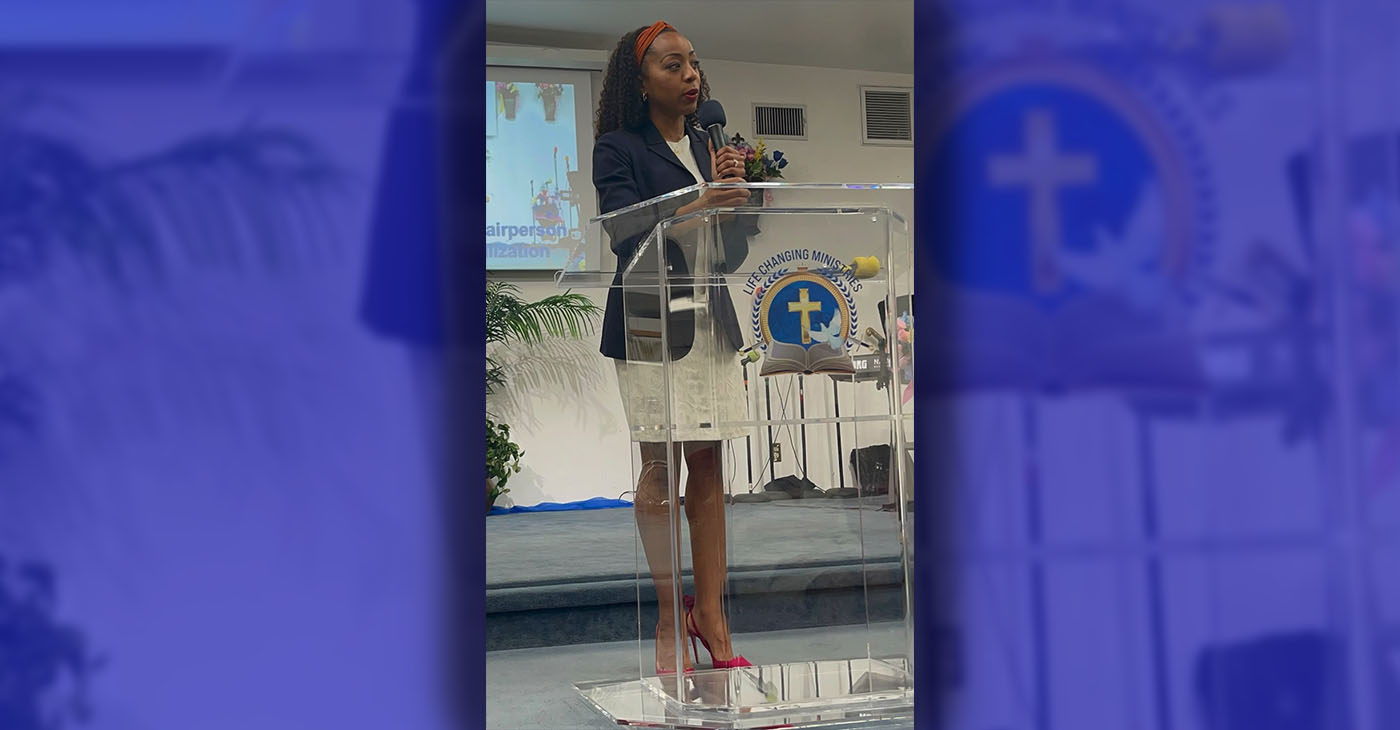
Antonio Ray Harvey
California Black Media
Over the next few months, Californians will spend time processing the details of Governor Gavin Newsom’s 2024-2025 spending plan, which he is expected to present to the Legislature on Jan. 10 in Sacramento. However, reports of the state’s whopping $68 billion budget deficit — as projected by the nonpartisan Legislative Analyst’s Office (LAO) — have foreshadowed the Governor’s announcement with uncertainty.
Despite anticipation of deep budget cuts, State Controller Malia M. Cohen has expressed confidence that California’s fiscal cash flow is in the position to withstand any financial challenges caused by forecasted economic downturn.
“Despite reports from various sources indicating a budgetary deficit of approximately $68 billion, the state’s cash position remains strong, and, absent any unforeseen circumstances, the state has sufficient cash to pay its bills and meet its financial obligations through the end of the fiscal year,” Cohen said in a Dec. 19, 2023, letter.
Cohen is responsible for accountability and disbursement of the state’s financial resources. She has independent auditing authority over government agencies that spend state funds.
According to the LAO, the budget shortfall increased by $53 billion when compared to the projections used in the development of the current year budget – up from $15 billion when the 2023–24 Budget was signed in June. The LAO faced challenges in providing budget estimates due the IRS delaying tax filings until Nov. 16, 2023.
Regarding personal income, sales and property tax revenues, the state’s primary revenues, California entered an economic downturn in 2022 that is affecting the budget.
On Dec. 15, Senate Minority Leader Brian W. Jones (R-San Diego) and Senate Budget Vice Chair Roger Niello (R-Fair Oaks) wrote a letter to Gov. Newsom, urging him to “act early” to address the state’s worsening fiscal condition.
“This budget deficit will impact every California resident and doesn’t matter whether you’re a Republican or Democrat,” Jones stated. “That’s why we must roll up our sleeves and work together to bring spending in line with revenues.”
Cohen has been monitoring the state’s financial reports and clarified California is protected by its “rainy day reserves.”
“The state currently has more than $91.4 billion in available borrowable resources, due in large part to the Governor’s and Legislature’s foresight in building prudent rainy-day reserves in the Budget Stabilization Account,” Cohen stated.
The budget negotiations will involve new leaders of the legislature — Assembly Speaker Robert Rivas (D-Salinas) and incoming Senate President Pro tempore Mike McGuire (D-Santa Rosa).
Rivas added California Legislative Black Caucus members Assemblymember Dr. Akilah Weber (D-La Mesa and Assemblymember Corey Jackson (D-Moreno Valley) to the Assembly’s budget leadership team in December. Weber will lead Subcommittee 1 on Health while Jackson will guide Subcommittee 2 on Human Services.
“While legislators will have difficult choices to make in the new year, I am confident they will be deliberate in addressing the budget challenges before them, and I urge them to protect, to the extent possible, the health and social service programs designed to benefit those who are displaced, without shelter, or otherwise economically disadvantaged,” Cohen stated.
-

 Activism4 weeks ago
Activism4 weeks agoOakland Post: Week of March 27 – April 2, 2024
-

 #NNPA BlackPress4 weeks ago
#NNPA BlackPress4 weeks agoCOMMENTARY: D.C. Crime Bill Fails to Address Root Causes of Violence and Incarceration
-

 #NNPA BlackPress4 weeks ago
#NNPA BlackPress4 weeks agoFrom Raids to Revelations: The Dark Turn in Sean ‘Diddy’ Combs’ Saga
-

 #NNPA BlackPress4 weeks ago
#NNPA BlackPress4 weeks agoCOMMENTARY: Lady Day and The Lights!
-

 #NNPA BlackPress4 weeks ago
#NNPA BlackPress4 weeks agoMayor, City Council President React to May 31 Closing of Birmingham-Southern College
-

 #NNPA BlackPress4 weeks ago
#NNPA BlackPress4 weeks agoBaltimore Key Bridge Catastrophe: A City’s Heartbreak and a Nation’s Alarm
-

 #NNPA BlackPress4 weeks ago
#NNPA BlackPress4 weeks agoBaltimore’s Key Bridge Struck by Ship, Collapses into Water
-

 #NNPA BlackPress4 weeks ago
#NNPA BlackPress4 weeks agoBeloved Actor and Activist Louis Cameron Gossett Jr. Dies at 87















































